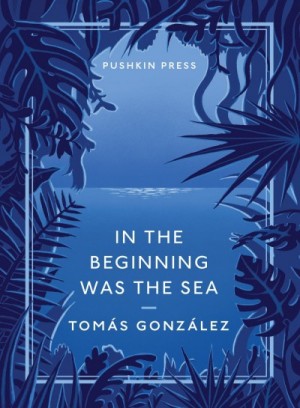You have no items in your cart. Want to get some nice things?
Go shopping Newly translated into English for Pushkin Press, Tomas Gonzalez’s debut novel arrives thirty years after its initial publication in Columbia, offering a new generation an opportunity to engage with this exciting work. The novel begins with the glamour of a sea that seduces — the sea that presents an escape, an exotic getaway in the newfound paradise of Columbia’s Atlantic coast. Soon, however, the sun begins to burn, the insects bite, and the shiny, inevitably shallow, surface of appearances rubs off in the heat. A couple who seek out the sea to escape and build a life together are instead torn apart. The lucid, dreamlike quality of the novel is expertly rendered by Frank Wynne’s translation — everyday observations are enhanced with an intense beauty, from waves breaking “like maracas” to the haunting image of a bruise “blossoming” on the skin. Imagery rests calmly upon the surface, rippling gently throughout this short but profound tale.
Newly translated into English for Pushkin Press, Tomas Gonzalez’s debut novel arrives thirty years after its initial publication in Columbia, offering a new generation an opportunity to engage with this exciting work. The novel begins with the glamour of a sea that seduces — the sea that presents an escape, an exotic getaway in the newfound paradise of Columbia’s Atlantic coast. Soon, however, the sun begins to burn, the insects bite, and the shiny, inevitably shallow, surface of appearances rubs off in the heat. A couple who seek out the sea to escape and build a life together are instead torn apart. The lucid, dreamlike quality of the novel is expertly rendered by Frank Wynne’s translation — everyday observations are enhanced with an intense beauty, from waves breaking “like maracas” to the haunting image of a bruise “blossoming” on the skin. Imagery rests calmly upon the surface, rippling gently throughout this short but profound tale.
It’s a story that chimes as much with our world today as it did with Gonzalez’s contemporary Columbia in the 1970s, deeply conscious of the price that luxury bohemian lifestyles often cost for the working lives of the poor. The intensity and verisimilitude of the tale inevitably stems from its roots in reality: Gonzales’s own brother Juan, like the fictional J, abandoned the intellectual elite of the city to meet a tragic end in the remote idyll of the countryside. Speaking on this symmetry, Gonzalez assures us that he remains detached:
I studied it coldly… as a craftsman might study a fallen tree and calculate the size and shape of the canoe that might be made from it.
Such cool composure, however, is rarely achievable. Part of what makes Gonzalez’s book so interesting is the intense and painful observation of personal experience. When a tree falls in the novel, it is not studied in the distanced manner to which Gonzalez aspires. Instead, it represents a microcosm of existence — an entire world collapses among the branches. In the tragedy and intensity of a single felled tree, an entire universe comes crashing down:
Its fall — like the Apocalypse — brought down a whole world of parasites, birds’ nests, shrubs, vines and saplings. When all was still, the loggers hacked the fallen tree to pieces, dismembering it like a pack of ravening dogs.
Similarly, a large mango tree J spies on the land becomes a biblical totem: “exactly how I pictured the tree in the Garden of Eden”. The financial strain of his farming ambitions and his reproach for the squalid lives of the locals, however, leads to an end that’s more Cain and Abel than Adam and Eve. As so often in art and life, Gonzalez’s poor are those that remain invisible. They sink eerily into the background, blending into the surrounding landscape. At the same time, they remain threatening, their eyes “stealing” looks at Elena’s body. Eventually, she erects a notched wire fence as protection against voyeurs.
However this action remains futile in the face of class divisions. Rather than establishing a physical divide between the “peace” of a romantic idyll and the outside world, the fence instead highlights the traumas of the relationship now caged within the wired enclosure. The fence itself is ignored, bent, eventually broken. Elena seeks desperately and cruelly to dissociate herself from the locals, but she merely exacerbates the use of her body as a spectacle: her flesh caged within the selective confines of walls she builds herself.
In many ways, the fence serves as a central image to the tale: in the beginning was the sea; a place of no borders; an expanse of restlessly moving and un-confinable life. In squalid modernity, attempts to reconnect to this ancient freedom are clouded in tanning sessions and pseudo aspirations, drinking addictions and sexual frustrations.
As J and Elena strive to “find themselves” and free themselves from the “burden” of their academic lives they fail to recognise the greater and more fundamental freedom lost by those around them. It’s a first-world-problems set up, but one that touches poignantly on the dilemmas of mental trauma and physical abandonment. Their struggle comes from an attempt to escape not merely the world they have come from in Medellin, but the identities that they have sculpted from this upbringing. Attempting to shed this identity, Elena instead sheds her clothes, whereas J stews in his own hypocrisy — criticising the faults of others which he fails to identify within himself.
This novella brings to mind Ian McEwan’s recent remark that few longer novels “earn their length” — Gonzalez’s sharp and succinct delivery, combined with his crisp and startling imagery, leaves an impression upon a reader that takes time to fade.

About Thea Hawlin
Theodora (Thea) Hawlin is assistant editor and production manager of The London Magazine.





A great review, subtle and engaging–I’m off to read this!